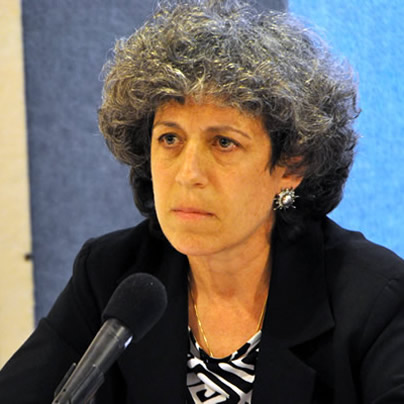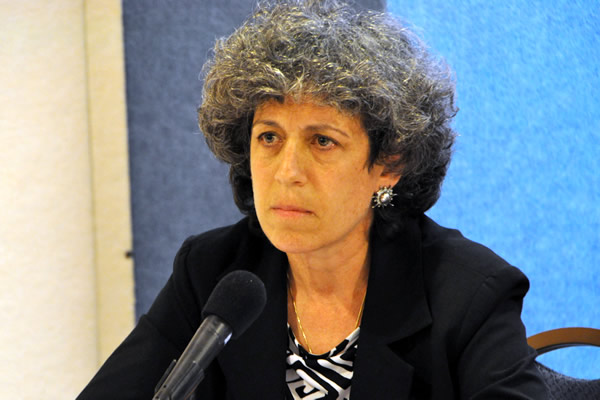National
Obama nominates lesbian attorney for judgeship
Kaplan named as candidate for U.S. Court of Federal Claims


Elaine Kaplan, Currently serves as U.S. Office of Personnel Management’s general counsel. (Blade photo by Michael Key)
President Obama on Tuesday named attorney Elaine D. Kaplan, the current general counsel for the U.S. Office of Personnel Management, as one of two nominees to become a judge on the United States Court of Federal Claims.
If confirmed by the U.S. Senate, Kaplan would become the second out gay person to serve on the specialized court, which hears cases brought by citizens against the federal government to recover monetary damages.
In 2009, Obama appointed Federal Claims Court Judge Emily C. Hewitt, a lesbian, to become the court’s chief judge. Hewitt, whose 15-year term on the court ends in October, was first appointed to the court by President Bill Clinton in 1998.
On Tuesday, Obama also nominated attorney Patricia E. Campbell-Smith to become a judge on the Court of Federal Claims. Campbell-Smith has been serving since 2005 as a special master for the court as part of its program to adjudicate cases involving vaccine related injuries.
“These nominees have dedicated their careers to serving the public good,” the president said in a statement released by the White House. “And in so doing, they have displayed an unyielding commitment to justice and integrity,” he said.
“I am certain that they will serve the American people well from the Court of Federal Claims, and I am honored to nominate them today,” Obama said.
Kaplan has served as general counsel for OPM since 2009 under gay OPM Director John Berry, who was one of Obama’s first high-level gay appointees.
Prior to joining the Obama administration, Kaplan worked from 2004 to 2009 as Senior Deputy General Counsel for the National Treasury Employees Union and from 2003 to 2004 as an attorney for the D.C. law firm Bernabei and Katz.
In 1998, Kaplan was nominated by President Bill Clinton and unanimously confirmed by the Senate to serve as director of the U.S. Office of Special Counsel, where she served a designated five-year term that extended into the first two years of the administration of President George W. Bush.
Congress created the Office of Special Counsel as an independent agency intended to protect the merit-based U.S. civil service system by investigating and prosecuting complaints of prohibited personnel practices against federal government employees. The OSC is also charged with protecting whistleblowers who report instances of government misconduct or waste from improper reprisals.
Kaplan made news during her tenure as OSC chief when she strengthened protections against discrimination based on federal employees’ sexual orientation, citing a provision in the existing U.S. civil service law that she interpreted to cover LGBT employees.
She became the subject of further news reports after completing her term at the OSC when her successor named by Bush, anti-gay attorney and religious right figure Scott J. Bloch, reversed her policy toward gay federal workers. In an action that created an uproar among LGBT activists, Bloch declared that that no legal protections existed for gay or lesbian federal workers targeted for employment discrimination.
During her tenure as general counsel for the NTEU, Kaplan criticized Bloch for his actions as OSC head. Bloch subsequently became the target of an investigation by the FBI, which raided his office and home following allegations that he improperly sought to purge employees at the OSC who disagreed with him and allegedly was responsible for hiring a computer company to “scrub” files from his office computer. He resigned from his OSC position in 2008.
Shortly after pleading guilty in 2011 for contempt of Congress, for allegedly failing to disclose information requested during a congressional hearing, Bloch filed a lawsuit against more than a dozen people he claimed conspired to have him ousted from his job at the OSC. Among those named in the lawsuit, which sought $202 million damages, were Kaplan, Berry, and the Human Rights Campaign, which Bloch accused of conspiring with Kaplan and others to oust him from his job.
According to a clerk at the Fairfax County, Va., Circuit Court where Bloch filed the lawsuit, Circuit Court Judge Jane Roush dismissed the lawsuit on June 29, 2012 without prejudice. The “without prejudice” dismissal gave Bloch the option of filing the case again within six months under Circuit Court rules, but the clerk said there is no record of him having done so.
D.C. attorney Debra Katz, who was also named as a defendant in Bloch’s lawsuit, told the Blade the judge dismissed the case on grounds of “failure to prosecute” because Bloch, who represented himself in court, never served any of the named defendants with a complaint or summons.
Federal Government
UPenn erases Lia Thomas’s records as part of settlement with White House
University agreed to ban trans women from women’s sports teams

In a settlement with the Trump-Vance administration announced on Tuesday, the University of Pennsylvania will ban transgender athletes from competing and erase swimming records set by transgender former student Lia Thomas.
The U.S. Department of Education’s Office for Civil Rights found the university in violation of Title IX, the federal rights law barring sex based discrimination in educational institutions, by “permitting males to compete in women’s intercollegiate athletics and to occupy women-only intimate facilities.”
The statement issued by University of Pennsylvania President J. Larry Jameson highlighted how the law’s interpretation was changed substantially under President Donald Trump’s second term.
“The Department of Education OCR investigated the participation of one transgender athlete on the women’s swimming team three years ago, during the 2021-2022 swim season,” he wrote. “At that time, Penn was in compliance with NCAA eligibility rules and Title IX as then interpreted.”
Jameson continued, “Penn has always followed — and continues to follow — Title IX and the applicable policy of the NCAA regarding transgender athletes. NCAA eligibility rules changed in February 2025 with Executive Orders 14168 and 14201 and Penn will continue to adhere to these new rules.”
Writing that “we acknowledge that some student-athletes were disadvantaged by these rules” in place while Thomas was allowed to compete, the university president added, “We recognize this and will apologize to those who experienced a competitive disadvantage or experienced anxiety because of the policies in effect at the time.”
“Today’s resolution agreement with UPenn is yet another example of the Trump effect in action,” Education Secretary Linda McMahon said in a statement. “Thanks to the leadership of President Trump, UPenn has agreed both to apologize for its past Title IX violations and to ensure that women’s sports are protected at the university for future generations of female athletes.”
Under former President Joe Biden, the department’s Office of Civil Rights sought to protect against anti-LGBTQ discrimination in education, bringing investigations and enforcement actions in cases where school officials might, for example, require trans students to use restrooms and facilities consistent with their birth sex or fail to respond to peer harassment over their gender identity.
Much of the legal reasoning behind the Biden-Harris administration’s positions extended from the 2020 U.S. Supreme Court case Bostock v. Clayton County, which found that sex-based discrimination includes that which is based on sexual orientation or gender identity under Title VII rules covering employment practices.
The Trump-Vance administration last week put the state of California on notice that its trans athlete policies were, or once were, in violation of Title IX, which comes amid the ongoing battle with Maine over the same issue.
New York
Two teens shot steps from Stonewall Inn after NYC Pride parade
One of the victims remains in critical condition

On Sunday night, following the annual NYC Pride March, two girls were shot in Sheridan Square, feet away from the historic Stonewall Inn.
According to an NYPD report, the two girls, aged 16 and 17, were shot around 10:15 p.m. as Pride festivities began to wind down. The 16-year-old was struck in the head and, according to police sources, is said to be in critical condition, while the 17-year-old was said to be in stable condition.
The Washington Blade confirmed with the NYPD the details from the police reports and learned no arrests had been made as of noon Monday.
The shooting took place in the Greenwich Village neighborhood of Manhattan, mere feet away from the most famous gay bar in the city — if not the world — the Stonewall Inn. Earlier that day, hundreds of thousands of people marched down Christopher Street to celebrate 55 years of LGBTQ people standing up for their rights.
In June 1969, after police raided the Stonewall Inn, members of the LGBTQ community pushed back, sparking what became known as the Stonewall riots. Over the course of two days, LGBTQ New Yorkers protested the discriminatory policing of queer spaces across the city and mobilized to speak out — and throw bottles if need be — at officers attempting to suppress their existence.
The following year, LGBTQ people returned to the Stonewall Inn and marched through the same streets where queer New Yorkers had been arrested, marking the first “Gay Pride March” in history and declaring that LGBTQ people were not going anywhere.
New York State Assemblywoman Deborah Glick, whose district includes Greenwich Village, took to social media to comment on the shooting.
“After decades of peaceful Pride celebrations — this year gun fire and two people shot near the Stonewall Inn is a reminder that gun violence is everywhere,” the lesbian lawmaker said on X. “Guns are a problem despite the NRA BS.”
New York
Zohran Mamdani participates in NYC Pride parade
Mayoral candidate has detailed LGBTQ rights platform

Zohran Mamdani, the candidate for mayor of New York City who pulled a surprise victory in the primary contest last week, walked in the city’s Pride parade on Sunday.
The Democratic Socialist and New York State Assembly member published photos on social media with New York Attorney General Letitia James, telling followers it was “a joy to march in NYC Pride with the people’s champ” and to “see so many friends on this gorgeous day.”
“Happy Pride NYC,” he wrote, adding a rainbow emoji.
Mamdani’s platform includes a detailed plan for LGBTQ people who “across the United States are facing an increasingly hostile political environment.”
His campaign website explains: “New York City must be a refuge for LGBTQIA+ people, but private institutions in our own city have already started capitulating to Trump’s assault on trans rights.
“Meanwhile, the cost of living crisis confronting working class people across the city hits the LGBTQIA+ community particularly hard, with higher rates of unemployment and homelessness than the rest of the city.”
“The Mamdani administration will protect LGBTQIA+ New Yorkers by expanding and protecting gender-affirming care citywide, making NYC an LGBTQIA+ sanctuary city, and creating the Office of LGBTQIA+ Affairs.”




















